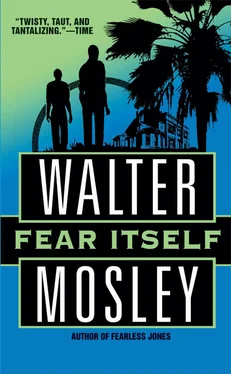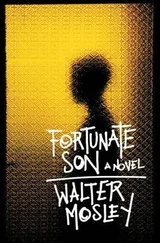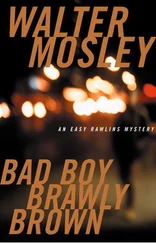Walter Mosley - Fear Itself
Здесь есть возможность читать онлайн «Walter Mosley - Fear Itself» весь текст электронной книги совершенно бесплатно (целиком полную версию без сокращений). В некоторых случаях можно слушать аудио, скачать через торрент в формате fb2 и присутствует краткое содержание. Жанр: Старинная литература, на русском языке. Описание произведения, (предисловие) а так же отзывы посетителей доступны на портале библиотеки ЛибКат.
- Название:Fear Itself
- Автор:
- Жанр:
- Год:неизвестен
- ISBN:нет данных
- Рейтинг книги:4 / 5. Голосов: 1
-
Избранное:Добавить в избранное
- Отзывы:
-
Ваша оценка:
- 80
- 1
- 2
- 3
- 4
- 5
Fear Itself: краткое содержание, описание и аннотация
Предлагаем к чтению аннотацию, описание, краткое содержание или предисловие (зависит от того, что написал сам автор книги «Fear Itself»). Если вы не нашли необходимую информацию о книге — напишите в комментариях, мы постараемся отыскать её.
Fear Itself — читать онлайн бесплатно полную книгу (весь текст) целиком
Ниже представлен текст книги, разбитый по страницам. Система сохранения места последней прочитанной страницы, позволяет с удобством читать онлайн бесплатно книгу «Fear Itself», без необходимости каждый раз заново искать на чём Вы остановились. Поставьте закладку, и сможете в любой момент перейти на страницу, на которой закончили чтение.
Интервал:
Закладка:
Finally the main character, who was also called Amos, came across a woman who was attempting to throw herself off of the Golden Gate Bridge in the early hours of the morning. He saved her and talked to her. He convinced her that her life was worth living. Her name was Crystal Limmer and she was a painter, a watercolorist.
That was about the first hundred and fifty pages of the book. I’m a fast reader, but I never finish a book if I don’t see a reason for it. Mr. Amso’s book would either have the hero being pulled out of darkness by this bright gem of a woman or he would lose himself to a gloom he’d never known before finding love. Either way I wasn’t interested, so I put the book back on the shelf.
At least I tried to return it. The books had been packed so tightly that Night Man no longer fit in the space I took it from. I pride myself in organizing space on bookshelves, so I took out a few other books in order to accommodate the full complement.
I removed three Zane Grey westerns. But before I could do anything else, I noticed that there was something behind the first row of books. The shelves were quite a bit deeper than I thought. They were actually set deep into the wall. There was a good six inches of space behind the first row of books.
There was another book back there. A thick book with a hard leather cover that had an embossed design but no writing on it. It was thicker than a bible and the pages were not made of paper but of animal skin. The cover and back were wood with cow’s leather stretched over it. And each page was scrawled on with handwriting from various hands in differing kinds and colors of ink.
The first line of the first page read:
I am Gheeza Manli daughter of Menzi and Allatou born into slavery in the year of the devil seventeen hundred and two . . .
Much of what Gheeza wrote was difficult to make out, while many sections were completely impossible for me to read. She wrote in extraordinarily small script. Her entries went on for about forty pages, telling something of her impossible tale and interrupting that story now and then to tell of births, deaths, and smaller or larger crimes committed against her or that she committed against her masters. Gheeza had a daughter named Asha. Asha took over the duty of maintaining the entries on page forty-two.
Asha was called Mary by her slave masters, as her mother Gheeza was called Tulip by the same owners. The book was their story, kept secret from the world of their masters. The book was bound by Tellman, who had been from a long line of binders of prayer books for the people of the kingdom of Ethiopia.
A floorboard creaked somewhere in the rambling rooming house. I pushed the westerns and Mr. Amso’s book back into the shelf any way they would go, hugged the handmade book to my chest, and covered it with a pillow from the sofa. Then I hurried down the hall and up the stairs with the treasure clutched so tightly that my arms ached from the effort.
Once in my room I wedged a chair against the doorknob, remembering for a moment that I had done the same thing in Lance Wexler’s apartment. I turned on the overhead light and pored over the three hundred pages of animal skin that had been scrawled upon by more than a dozen hands. Now and then there were drawings of plantation houses and slave quarters, of agricultural machines and torture devices used on slaves. From 1781 to 1798 Moses, the only male diarist, also drew and painted pictures of his parents, grandparents, his wife and children. He entered twenty-three colorful pictures in all, and while they were crude there was still something poignant and dignified about the dark faces in their slave clothes and quarters.
The last entry was in 1847 by Abathwa, daughter of Elthren, daughter of Moses. All of these names were secret appellations given in private ceremonies when the masters were sleeping. On the last page Abathwa referred to another book that would be used to continue the memories of the kinfolk of Africa.
At first I thought that the book was some kind of fiction, that it was created by some artist, or more probably artists, trying to create a history out of the tragedy of slavery. But there was no questioning that the book was at least over a hundred years old. And there was no reason to doubt that it went all the way back to the eighteenth century as it claimed.
But what was it doing in a boardinghouse library in black L.A.?
It couldn’t belong to Miss Moore. She wouldn’t have left such a treasure in a public room. Maybe the house belonged to someone else, or maybe the previous owner had inherited the book from a long line that stretched all the way back to the ancient African kingdoms.
As the hours passed I put together what I felt was the probable history of the book. It was definitely an artifact from the days of slavery, though possibly not as old as it seemed. It had been passed down with subsequent volumes to some man or woman who came into possession of Miss Moore’s house earlier in the century. This man or woman had hidden the book and then grew old and senile. So the book sat there in its hiding place behind the ever-changing row of popular novels until I came upon it.
So if it wasn’t Miss Moore’s book then it was fair game for me.
It was nearly five in the morning when I closed the covers and still I hadn’t worked out ten solid pages of text. I imagined spending the next year in my little shop deciphering the entries of those long-ago slaves.
I forgot all about Fearless and Milo, about the murderous Mr. Timmerman and the dead Wexler siblings. I forgot about the Watermelon Man and the strange Fine sisters who lived in luxury and in squalor. That’s what a good book will do for me. It doesn’t make me into a brave man exactly but just erases all vestiges of fear.
24
I FELL ASLEEP WITH THE SUNRISE, amid the sounds of the tenants getting ready to go off to work. The smell of coffee wafted up into my room, but I was too tired to climb down the stairs. And even if I hadn’t been so weary I wouldn’t have left my book. It was the most precious thing I had ever seen or touched.
I slept until after nine o’clock. When I had to go to the bathroom I took the book with me, wrapped in a pillowcase. I didn’t go out of the room except for that one time.
Thieves are the people most afraid of being robbed.
I put the book under the bed and sat at the window, waiting and planning. I figured out how I was going to smuggle my treasure out of Miss Moore’s rooming house, and where I could hide it until Fearless’s problems had been solved.
After that I started to think about Bartholomew Perry. If I could find him what should I do? Milo would want me to report to him. Winifred L. Fine would also expect an accounting. Of course, there was Leora Hartman, Kit Mitchell, and, most of all, the Los Angeles Police Department that I had to be concerned with.
I needed BB to talk to me, and that meant I needed Fearless. Fearless to keep BB from running away and Fearless to help me understand. That was because even though I knew the majority of words in the English dictionary, it was Fearless who understood the twists and turns of the human heart.
But before any of that came to pass I needed Charlotta.
She came to my door at three. I gave her a weak kiss. That’s because my passions weren’t under the covers but under the bed with my book at that particular moment.
“Did you find out where he is?” I asked her.
“Don’t you wanna kiss me some more, baby?” she replied.
“After I get my fifty dollars I’ll kiss you from your toes to your ears and everywhere in between,” I said. “But let me get this pistol from out my back first.”
“You promise?” she asked.
“You got skin like honey,” I said, “only it taste better’n that. I just need to make sure I live long enough to enjoy it.”
Читать дальшеИнтервал:
Закладка:
Похожие книги на «Fear Itself»
Представляем Вашему вниманию похожие книги на «Fear Itself» списком для выбора. Мы отобрали схожую по названию и смыслу литературу в надежде предоставить читателям больше вариантов отыскать новые, интересные, ещё непрочитанные произведения.
Обсуждение, отзывы о книге «Fear Itself» и просто собственные мнения читателей. Оставьте ваши комментарии, напишите, что Вы думаете о произведении, его смысле или главных героях. Укажите что конкретно понравилось, а что нет, и почему Вы так считаете.












